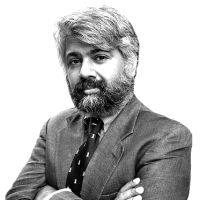
Surfing adroitly on a Goldman Sachs wave, the president has now addressed the subject of reform in the American financial industry. Aware that he has—on this subject at least—the keen attention of all Americans, he offered a lesson that appeared to be as much about the civics of business as it was about business itself.
Addressing a gathering at the Cooper Union in New York, Barack Obama made clear his view that the crisis in our financial system is largely the result of a failure of civic responsibility—of corporate citizenship, in effect—on the part of Wall Street. He spoke of “abuse,” of “excesses,” and of a financial culture prone to “game the system,” one in which companies “made out like bandits.” A free market, he said, “was never meant to be a free license to take whatever you can get, however you can get it.” And yet they took freely from us, these unchecked bandits, these Wall Street insiders, embarking on projects that imperiled the very foundations of our economy. Therefore, he said, we need reform. Ordinary Americans must never again be at the mercy of Wall Street. Nunca mas.
Obama’s invitation to debate, here, is akin to his conversation on health-care reform: It is a call to all to come to him, and to drink deeply of his wisdom.
There is no doubt that Obama is tapping, here, into a rich seam of public discontent. The view that Wall Street has wrought havoc on our economy is held by many more Americans than not, and so any assertion by the president that Something Must Be Done is likely to meet with popular—and populist—approval. A fear and loathing of Big Business is evident among ordinary Americans on both the left and the right. You can see it at gatherings of Tea Partiers as much as on university campuses.
So the president is politically astute in his call for “a debate” on financial reform. But his speech Thursday should give rise to great concern about the nature and extent of that debate, and of his willingness to entertain any idea that he does not already embrace.
In pressing ahead with his preferred template for financial reform—Chris Dodd’s Senate bill—Obama appears to have foreclosed prematurely on the sort of genuine, wide-ranging, open-minded national debate that we need to have to safeguard our economic future. Foreclosure on debate, never edifying, might have been fine if Obama’s own template were a thing of beauty; but it is, instead, a deeply flawed bill with much in it that is wrong (and wrong-headed), particularly in regard to the proposed Consumer Financial Protection Bureau, the provisions on ratings agencies, and the potentially vast expansion of the FDIC’s powers—not to mention the alarming effect the Dodd rules would have on start-ups, as described in The Wall Street Journal Thursday.
But Obama’s invitation to debate, here, is akin to his conversation on health-care reform: It is a call to all to come to him, and to drink deeply of his wisdom. Of a piece with this method is Harry Reid’s assertion Thursday that he will move ahead with a vote on financial reform as early as Monday: “I’m not going to waste any more time of the American people while they come up with some agreement,” Reid said, of the Republicans. “The games of stalling are over.”
Yet ill-conceived reform would be just as bad as no reform at all, and the Republicans have every reason to resist knee-jerk legislation fueled largely by a populist consternation with the way Wall Street does business. As the sage Martin Wolf wrote in the Financial Times Wednesday, “halting the financial doomsday machine is going to involve fundamental changes in policy towards—and the structure of—the financial system.”
This cannot be accomplished in a tearing haste, and needs to focus as much, if not more, on new principles as on new rules. And principles will not crystallize without debate—and certainly not by Monday. The foremost principle, of course, is transparency. There are sleazebags aplenty on Wall Street (and plenty in “real America", too), and you cannot eradicate sleazebags with new rules. A new set of rules will be parsed in no time by the industry and its lawyers, and skirted; rules tend to hide sleaze in dark corners. With more transparency, open books, exchanges, etc., it is more likely that integrity and reputation will win out.
Ultimately, what emerged most clearly from Obama’s speech was his faith in the efficacy of regulation, and, by implication, his belief in the intelligence and objectivity of regulators. In this, he revealed—and not for the first time—his predilection for political control of the economy. This, alas, is where a great danger lurks for a genuine free market: Do we really want Big Government to save us from Big Business?
Tunku Varadarajan is a national affairs correspondent and writer at large for The Daily Beast. He is also a research fellow at Stanford’s Hoover Institution and a professor at NYU’s Stern Business School. He is a former assistant managing editor at The Wall Street Journal. (Follow him on Twitter here.)






